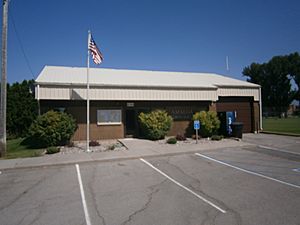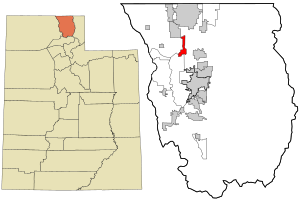Amalga, Utah facts for kids
Quick facts for kids
Amalga, Utah
|
|
|---|---|
|
Town
|
|

Amalga Town Hall
|
|

Location in Cache County and the state of Utah.
|
|
| Country | United States |
| State | Utah |
| County | Cache |
| Settled | 1869 |
| Incorporated | 1938 |
| Founded by | Hans Jorgensen |
| Named for | Amalgamated Sugar Company |
| Area | |
| • Total | 3.61 sq mi (9.35 km2) |
| • Land | 3.48 sq mi (9.02 km2) |
| • Water | 0.12 sq mi (0.32 km2) |
| Elevation | 4,446 ft (1,355 m) |
| Population
(2010)
|
|
| • Total | 482 |
| • Density | 160.11/sq mi (61.83/km2) |
| Time zone | UTC-7 (MST) |
| • Summer (DST) | UTC-6 (MDT) |
| ZIP code |
84335
|
| Area code(s) | 435 |
| FIPS code | 49-01090 |
| GNIS feature ID | 2412359 |
Amalga is a small town located in Cache County, Utah, in the United States. Its name is pronounced ə-MAL-gə. In 2020, about 482 people lived there. It is part of the larger Logan metropolitan area, which includes parts of Utah and Idaho.
Many people in Amalga are dairy farmers, and many families own their own herds of cows. The town is also home to the Cache Valley Cheese plant, where milk is turned into delicious cheese. The nearby town of Smithfield shares its post office and library with Amalga.
Contents
History of Amalga
Early Settlement and Growth
Amalga was first settled in 1869 by a Mormon pioneer named Hans Jorgensen. More settlers began to arrive in 1891. By March 22, 1891, the town had a schoolhouse. This schoolhouse was a busy place, used for social events and church meetings.
The Sugar Factory Era
A big change came in 1916 when the Amalgamated Sugar Company decided to build a factory in the town. This factory was built to process sugar beets, which are plants used to make sugar. Because of this new factory, the town was named Amalga.
A special train track, called a spur line, was built by the Utah Idaho Central Railroad to serve the factory. A large hotel also opened to welcome workers and visitors. The factory was finished by 1917 and cost a lot of money to build.
In 1918, the local church group, the Amalga Ward of the LDS Church, was also named after the Amalgamated Sugar Company.
Factory Closure and New Beginnings
Sadly, the sugar factory closed in 1929. This happened because of a plant disease called sugar beet blight. The factory's machinery was taken apart and moved to California. The hotel and workers' houses were also torn down. Even the train tracks were removed. After this, sugar beets were sent by truck to Smithfield and then to a factory in Lewiston for processing.
In 1941, the Cache Valley Dairy Association bought the old sugar beet plant. They wanted to use it to turn their milk into Swiss cheese. They hired Edwin Gossner to make the cheese. He worked there from 1942 until 1966, when he started his own company, Gossner Foods, in Logan.
Geography of Amalga
Amalga covers an area of about 3.5 square miles (9.1 square kilometers). Most of this area is land, about 3.4 square miles (8.7 square kilometers). A smaller part, about 0.2 square miles (0.4 square kilometers), is water. Most of the water is found in a swamp located north of the cheese factory.
Population and People
| Historical population | |||
|---|---|---|---|
| Census | Pop. | %± | |
| 1940 | 246 | — | |
| 1950 | 225 | −8.5% | |
| 1960 | 198 | −12.0% | |
| 1970 | 207 | 4.5% | |
| 1980 | 323 | 56.0% | |
| 1990 | 366 | 13.3% | |
| 2000 | 427 | 16.7% | |
| 2010 | 488 | 14.3% | |
| 2020 | 482 | −1.2% | |
| U.S. Decennial Census | |||
Over the years, Amalga's population has changed. In 1940, there were 246 people. The population went down for a while but then started to grow. By 2020, the town had 482 residents.
In 2000, there were 427 people living in Amalga. Many households had children under 18 living with them. Most families were married couples living together. The average household had about 3.59 people.
The population was quite young, with many people under 18 years old. The median age was 27 years. This means half the people were younger than 27 and half were older.
See also
 In Spanish: Amalga para niños
In Spanish: Amalga para niños
 | Calvin Brent |
 | Walter T. Bailey |
 | Martha Cassell Thompson |
 | Alberta Jeannette Cassell |

